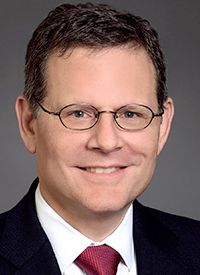Article
ASCO Partners With FDA to Incorporate Real-World Evidence Into Drug Decisions
Author(s):
In recognition of the potential for real-world evidence to significantly improve the way patients with cancer are treated, CancerLinQ has formed new partnerships with the US government that are expected to coordinate the sharing of patient data and incorporate that information into the FDA regulatory process.
Clifford A. Hudis, MD, CEO of ASCO

Clifford A. Hudis, MD
In recognition of the potential for real-world evidence (RWE) to significantly improve the way patients with cancer are treated, CancerLinQ has formed new partnerships with the US government that are expected to coordinate the sharing of patient data and incorporate that information into the FDA regulatory process.
CancerLinQ is a subsidiary created by ASCO to extrapolate treatment insights from the vast amounts of oncology treatment data being collected through electronic systems. The CancerLinQ network encompasses 90 oncology practices and institutions in 40 states. Under one of the newly announced partnerships, CancerLinQ Discovery, a research and analytics platform, will share deidentified patient data with the FDA to help inform regulatory decisions.
The initial focus will be on advanced melanoma and include a review of checkpoint inhibitors and molecularly targeted therapies, with the goal of improving clinical use of these therapies and guiding future FDA regulatory reviews.
RWE is increasingly considered vital for the development of treatment strategies in oncology because patients who enroll in clinical trials, upon which FDA drug approvals are based, tend to be in better health and less diverse than the patient populations that are typically treated in cancer clinics. Organizations that study patient outcomes have noted that these differences in population types are significant and that RWE should be made known to both the FDA and clinicians to help inform treatment decisions and strategies.
Officials from CancerLinQ and the FDA said the agreement will pick up where clinical trials leave off by collecting RWE on outcomes following drug approvals and funneling that information back to the FDA.
“Until now, our learning about new treatments was hindered by the limited number of physicians and patients involved in traditional research and slowed significantly when formal clinical trials ended,” said Clifford A. Hudis, MD, CEO of ASCO and chairman of the CancerLinQ board of governors.
The FDA also praised the agreement, stating that RWE would enable the FDA to turn its attention to the point of care and pay closer attention to the needs of the patient majority. Sean Khozin, MD, MPH, acting associate director for oncology regulatory science and informatics in the FDA’s Oncology Center of Excellence, added that the collaboration with CancerLinQ would “contribute to the development of an empirically-derived framework for incorporation of real-world evidence into regulatory decision making.”
Officials also announced an agreement with the National Cancer Institute (NCI) to enable the sharing of treatment information between CancerLinQ and the NCI’s Surveillance, Epidemiology and End Results (SEER) program, which is a major source of data on cancer incidence and survival in the United States.
In the first phase of the project, data from SEER, a network of 18 central cancer registries covering 30% of the US population, will be incorporated into the CancerLinQ framework. In the second phase, oncology care providers from selected geographic regions will participate in a pilot project to upload data into the SEER registries through the CancerLinQ portal.
Healthcare facilities in the United States are already required to report cancer information to these registries, but the actual flow of that information is not as robust as it should be. “This NCI and CancerLinQ data sharing effort holds the promise to make legally-mandated cancer surveillance reporting activities more timely, efficient and complete, and will enhance the richness of SEER databases for population-level research with longitudinal, real-world data and insights from CancerLinQ,” a press release from ASCO stated.
Officials said that through the project they hope to further their goals of uniting the oncology community around common objectives and a sense of shared purpose. “When the cancer community combines its resources, we can greatly increase our chances of improving cancer care,” said Lynne Penberthy, MD, MPH, associate director for the Surveillance Research Program within the NCI. “This collaboration will provide cancer data that are difficult to capture from traditional surveillance methods. These additional sources will enhance our ability to understand patient care and outcomes.”
There are many public-private efforts underway to capitalize on RWE to improve outcomes and lower costs of care. Recently, Flatiron of New York demonstrated that oncology information gathered from multiple institutions could provide meaningful insight on patient populations that was not available to the FDA during the applications process.
Last year, in a project to examine use of checkpoint inhibitors nivolumab (Opdivo) and pembrolizumab (Keytruda) in patients with non—small cell lung cancer (NSCLC), Flatiron looked at a cohort of 1578 patients, far more than the FDA had seen from the relevant NSCLC clinical trial results. In the trials, the median age of patients was 61 and 64, respectively, whereas in the real world the median age is 69, and a third of the patients were over the age of 75.
Officials said the focus on advanced melanoma through the CancerLinQ-FDA initiative will include a review of checkpoint inhibitors and several molecularly targeted therapies. “While these treatments have collectively transformed care for advanced melanoma and extended many patients’ lives, there still exist unanswered questions about their use and adoption in the real world setting,” ASCO said in the release. “Relatively little is known about their specific benefits and risks in the elderly or in those with other serious health problems, because such patients are often not able to participate in studies, due to the stringent nature of most clinical trials.”
CancerLinQ and FDA investigators “will explore a variety of issues related to the use of newly approved therapies, including the optimal sequence of treatments, the impact that other health problems have on treatment tolerability and cancer outcomes, and the experience with immunotherapy combinations versus single agents,” ASCO said.







